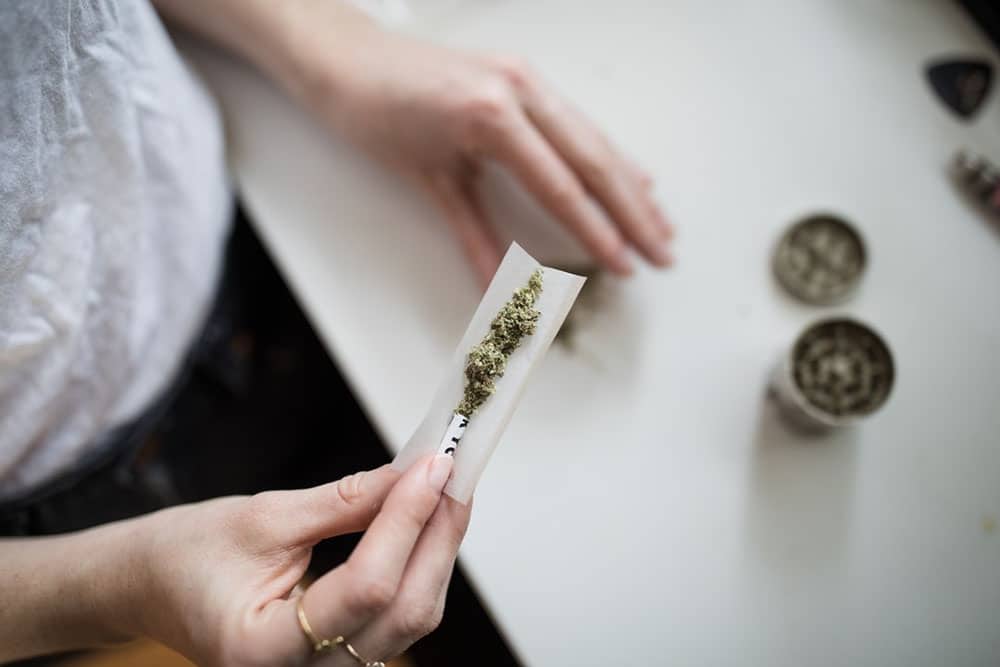Marijuana use has been glorified in music and media for decades. The recent and ongoing legalization of cannabis use for medicinal and recreational use in different countries has led to an increase in the popularity of the drug.
But is it addictive?
This article takes an in-depth look at cannabis and its effects on the mind and body, as well as addressing its potentially addictive properties.
What is Cannabis?

Mary Jane, weed, pot, grass, ganja, bud – all these and more are slang terms for Marijuana. Unprocessed marijuana is recognizable by its leaves, which are bright green and possess five fingers with serrated edges. Processed marijuana presents itself as a grayish-green mixture of dried leaves in clumps. Marijuana in this form has a distinct, dank, and recognizable smell which causes it to be referred to as “skunk weed”.
Cannabis sativa and cannabis indica are the two main strains of marijuana. Sativa’s primary effect is energizing whereas indica’s effects are more relaxing. Both strains of marijuana are used for recreational and medicinal purposes. Kush is a sub-strain of hybrid or pure cannabis indica. Hindu Kush, Afgan Kush, Purple Kush, and Green Kush are all strains of pure cannabis indica.
Marijuana can be smoked in hand-rolled cigarettes (joints); in pipes, water pipes (bongs), or in blunts (cigar wrap-rolled marijuana). Edibles are foods infused with marijuana, such as cookies, brownies, or candies. Vaporizers are also increasingly used to smoke cannabis.
What are Cannabinoids?
There are numerous chemical compounds contained in marijuana which are known as cannabinoids. Many of the effects of cannabis use are caused by these compounds.
The two major cannabinoids identified thus far are:
- Tetrahydrocannabinol (THC)
- Cannabidiol (CBD)
Some lesser-known cannabinoids are:
- Cannabinol (CBN) CBN is utilized to relieve symptoms of certain neurological conditions.
- Tetrahydrocannabinol acid (THCA) THCA is comparable to THC but has no psychoactive effects.
- Cannabigerol (CBG) CBG is shown to reduce anxiety, symptoms of obsessive-compulsive disorder, post-traumatic stress disorder (PTSD), and depression.
Is Cannabis Addictive Physically and Psychologically?
Marijuana use is indeed addictive. Prolonged use can lead to the development of marijuana use disorder, which in severe cases takes the form of addiction. It is four to seven times more likely for people who experiment with cannabis before turning 18 to develop marijuana use disorder in Portland, ME than those who don’t use it until adulthood.
When a person experiences withdrawal symptoms after abstaining from marijuana use, they can be said to have marijuana use disorder. There are a few symptoms that can accompany marijuana withdrawal. These symptoms normally peak within a week after last use, but can last up to a fortnight or longer.
Some of the withdrawal symptoms reported by cannabis users are:
- Sleeping difficulties
- Restlessness
- Physical discomfort in various forms
- Mood swings
- Cravings
- Diminished appetite
- Irritability
Cannabis’ Rising Potency
The pursuit of more intense highs from cannabis use has led marijuana farmers and growers to practice crossbreeding and other methods of increasing the THC content. This has, over the past few decades, brought about a steep increase in the potency of marijuana. Concentrated forms of marijuana, such as hash oil or waxy budder, have a much higher concentration of THC than dry cannabis leaves.
The current concern is that the consequences of marijuana could be exponentially worse than in the past.
What are Marijuana’s Long-Term Effects on the Brain?
In short, the long-term effects of marijuana use are not definite, since many studies use subjects who have other drugs and substances in their systems during the research period.
Many studies have been conducted that show marijuana use can impair a person’s cognitive abilities, memory, and lower IQ to a degree, but other studies show conflicting results. It is believed that other factors such as genetics, having a cannabis use disorder, age of first use, family environment, frequency of use, and duration of marijuana use all play a role in the effects on the brain, but the extent of these effects cannot yet be determined definitely.
Is Marijuana a Gateway Drug?
This is a tricky question to answer. There is evidence that supports the theory that marijuana is a gateway drug, but there is evidence that leans toward the latter as well. These are the main perceptions about marijuana being a gateway drug:
Yes, cannabis is a gateway drug. Some research supports marijuana being a gateway drug that can lead to the use of harder illegal and legal substances. THC’s ability to manipulate the reward center in the brain can make a user more susceptible to other drugs. Marijuana smokers’ peers and social circles may also lead to exposure to other drugs and substances.
It is known that certain cannabis users lace “joints” or “blunts” with harder drugs like cocaine. These “bananos”, as they are called, are often shared with first-time users and the unwary and lead to a dependence on hard drugs from the word “go”.
No, cannabis is not a gateway drug.The vast majority of marijuana users do not progress to experimenting with harder drugs or substances. Marijuana smoking rather reflects on a person’s personality, environment, past traumas, and genetic makeup.
It hinges on the person and the context. Adolescents whose brains are developing are more at risk for developing a marijuana dependency as well as experimenting with harder drugs. However, in other cases, marijuana can reduce the risk of developing a dependency on harder drugs, such as opiates, and may not lead to other drug use at all.
How Does Marijuana Affect School, Work, and Social Life?
Ask a cannabis user and odds are they will tell you they can smoke marijuana or use cannabis in its other concentrated forms, and still be able to function completely normally. The truth is that cannabis use can have deep-rooted effects on one’s life, depending on how often and how much they use it.
Cannabis Use and School Life
The acute effects of marijuana can wear off relatively quickly, but the adverse effects on memory, attention span, and learning abilities can last for several days and even weeks afterward. Someone who uses cannabis daily is most probably operating at a reduced intellectual level most of the time. Continual use of cannabis from an early age can lower a person’s academic or professional achievements.
Cannabis Use and Work Life
Regularly smoking marijuana can lead to increased instances of tardiness and absenteeism as well as more probable risks of injuries and accidents at school or work. Marijuana has adverse effects on a person’s perception of time, motivation, and judgment which leads to a person becoming increasingly unreliable and less responsible.
These effects can increase the risk of workplace injuries and errors, particularly for people who operate or drive heavy machinery while under the influence of cannabis.
Cannabis Use and Social Life
Continually smoking marijuana can lead a person to experience less life/social satisfaction in general. This can result in a person having fewer friends and make them have no or very little involvement in extracurricular activities. Marijuana use has alternating effects on a person’s personality, mood, and interests.
The effects that cannabis use can have on your social, school, or work life are not irreversible or inevitable. The use of marijuana can have different outcomes in people, due mainly to their personal choices and circumstances.
It is advisable to make oneself aware of the consequences and risks associated with marijuana use and to seek professional help if you feel you or a loved one may be developing dependencies or addictions to it.
Is There a Link Between Psychiatric Disorders and Marijuana Use?

The relationship between cannabis (marijuana) use and psychiatric disorders is complicated. Not enough research has been conducted to allow for definitive facts concerning the short and long-term effects of cannabis use on a person’s mental health.
A few studies have shown a link between marijuana use and earlier instances of developing psychosis in people whose genetic history increases the risk of them developing these conditions and are in need of schizophrenia and addiction rehab. These studies have also shown some worsening of already-existing psychosis symptoms among marijuana smokers. There is also a shred of evidence linking marijuana smoking to other mental health illnesses and leanings toward thoughts of self-harm and suicide.
What are Marijuana’s Effects on the Body?
Marijuana use can have various effects on the body, both physical and psychological. These effects can be different for everyone and depend on a myriad of factors such as the age of the use, their physical and mental history, how much cannabis is used, frequency of use, and a host of others.
Marijuana’s Effects on the Lungs
Cannabis is an irritant to the throat and lungs and often causes heavy coughing during use. Marijuana smoke contains very high levels of flammable substances and tar similar to smoke from tobacco. There is a definite concern for lung diseases and cancers developing in cannabis smokers. Smoke from marijuana has also led to increased airway resistance, hyperinflation of the lungs, and large inflammation of the airways. Regular marijuana smokers also have more reported cases of chronic bronchitis than non-smokers.
Some research proposes that the immune-suppressing effects of THC can increase the chances of a person contracting respiratory infections like pneumonia.
Marijuana’s Other Physical Effects
Cannabis smoke elevates a person’s heart rate within a few minutes of the first puff. The airways relax and expand and the capillaries in the eyes expand and give them a bloodshot appearance.
Evidence shows that the risk of suffering a heart attack is amplified by five times more than usual during the first hour after smoking. Marijuana’s effects on the heart rate and blood oxygen level can lead to fainting spells or dizziness when standing up, a condition known as orthostatic hypotension.
There is a direct link between cannabis use in adolescence and an increased risk of developing a potent form of testicular cancer, non-seminomatous testicular germ cell tumor (NSGCT), as shown by recent studies. This shows that marijuana’s contribution to this form of cancer in young, adult males accumulates over just a few years.
Chronic marijuana smoking can lead to Cannabinoid Hyperemesis Syndrome (CHS), though these cases are rare. This is a condition characterized by recurrent episodes of dehydration, severe nausea, and vomiting, and mainly affects people who have a long history of smoking marijuana and are under 50 years old.
Marijuana’s Psychological Effects
Smoking marijuana can have various psychological effects on your mind, depending on the dose, the potency, the frequency, and the individual factors of the user.
Some of the possible effects are:
The “High”
Marijuana smoking causes a “high”, which means increased sensation sensitivity, deep relaxation, and feelings of euphoria. This is the result of THC’s properties that affect the pleasure centers of the brain.
Cannabis smokers who are unused to the drug or use too much of it can experience bouts of fear, anxiety, panic, and/or paranoia. Marijuana can impact a person’s perception, mood, and cognition, and in some cases can trigger undesirable feelings and thoughts.
Hallucinations
People with histories of mental illnesses or who smoke huge doses of cannabis can suffer delusions, hallucinations, and/or psychotic episodes. Marijuana is known to alter certain people’s sense of reality and make them lose touch with their present selves, and in severe cases see and hear things that are not there.
Cannabis can alter a person’s brain chemistry, stunt their mental development, and can interfere with their ability to function normally, and damage their emotional well-being.
Marijuana Addiction
Excessive use of marijuana can lead to a dependency forming, and ultimately an addiction. You will crave cannabis, compulsively use it, and may experience extreme difficulties with attempts to reduce use or stop the drug altogether.
These possible psychological effects of marijuana smoking are neither predictable nor inevitable. Different people experience varying effects when smoking cannabis. Genetics, age, social environment, personality, and other factors can work to change the effects of smoking marijuana.
Casco Bay Recovery Can Assist with Marijuana Addiction

If you fear you or someone you love may currently have or be developing a dependency on marijuana, contact one of our admissions specialists today for more information on our treatment programs. Casco Bay Recovery specializes in treating marijuana use disorder and its psychological and physical effects. Everyone deserves to live a healthy life free of substance use problems. Never be afraid to reach out for assistance, we can help you today.






